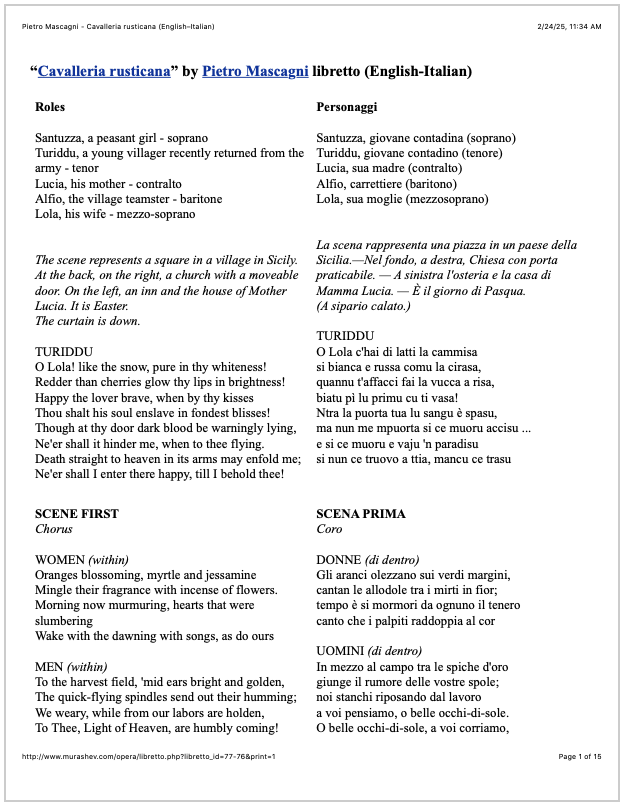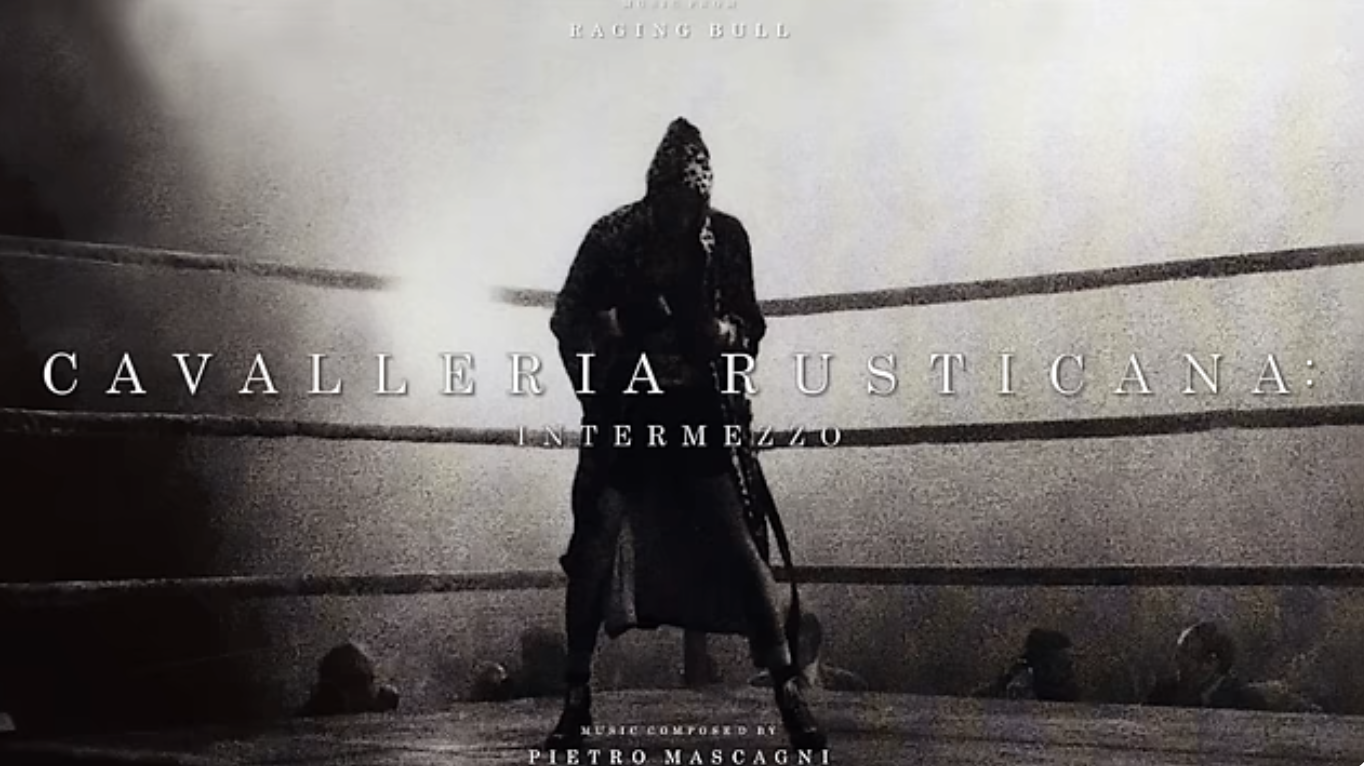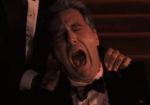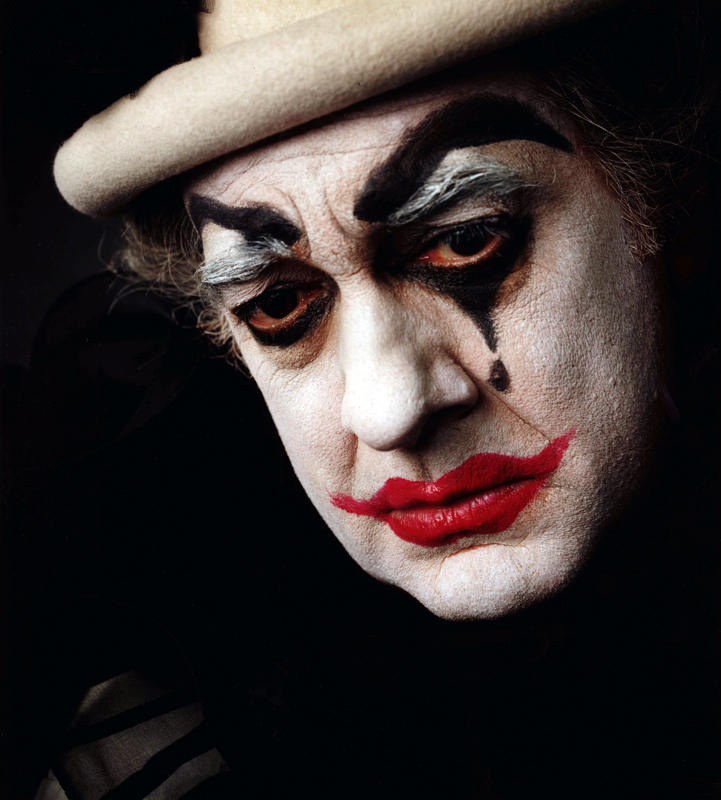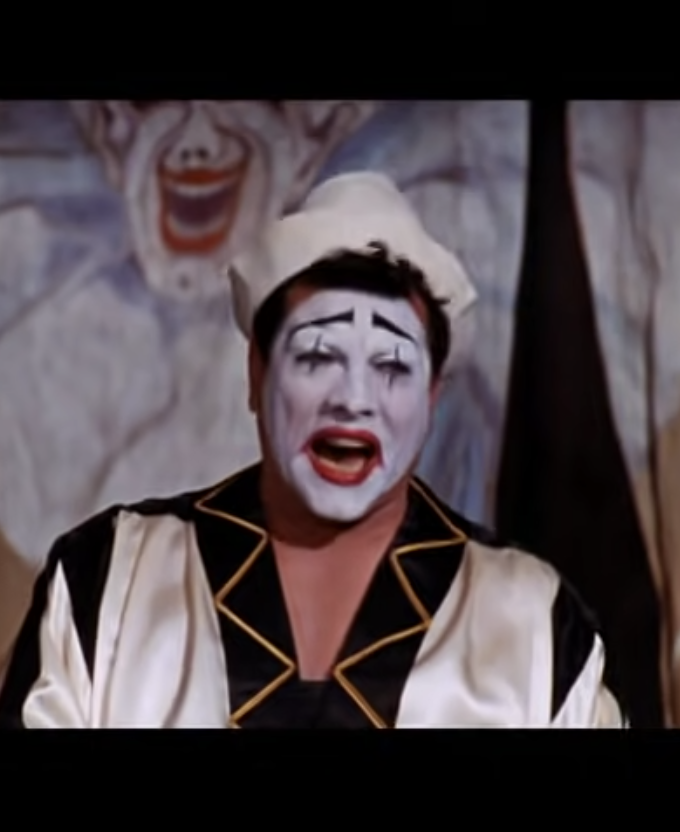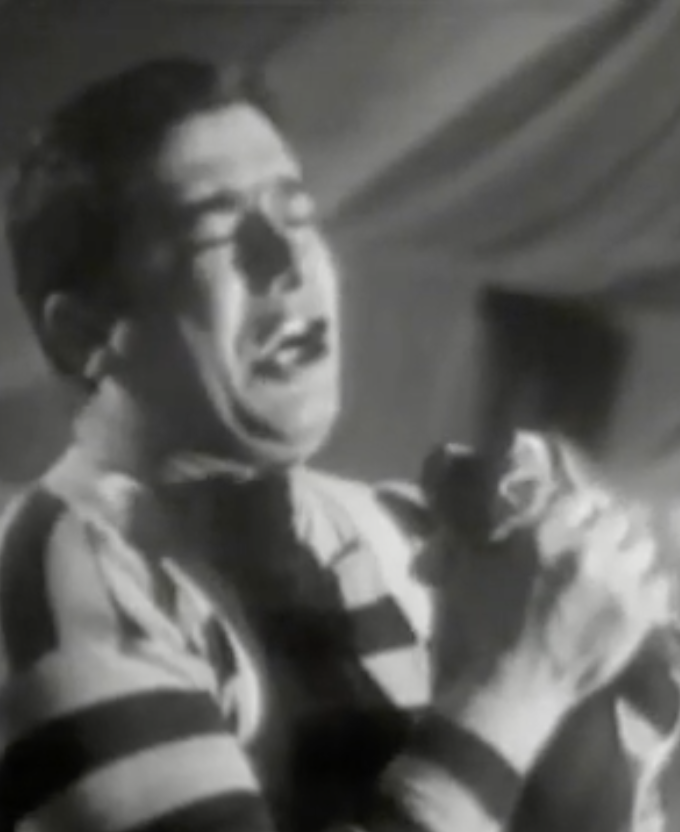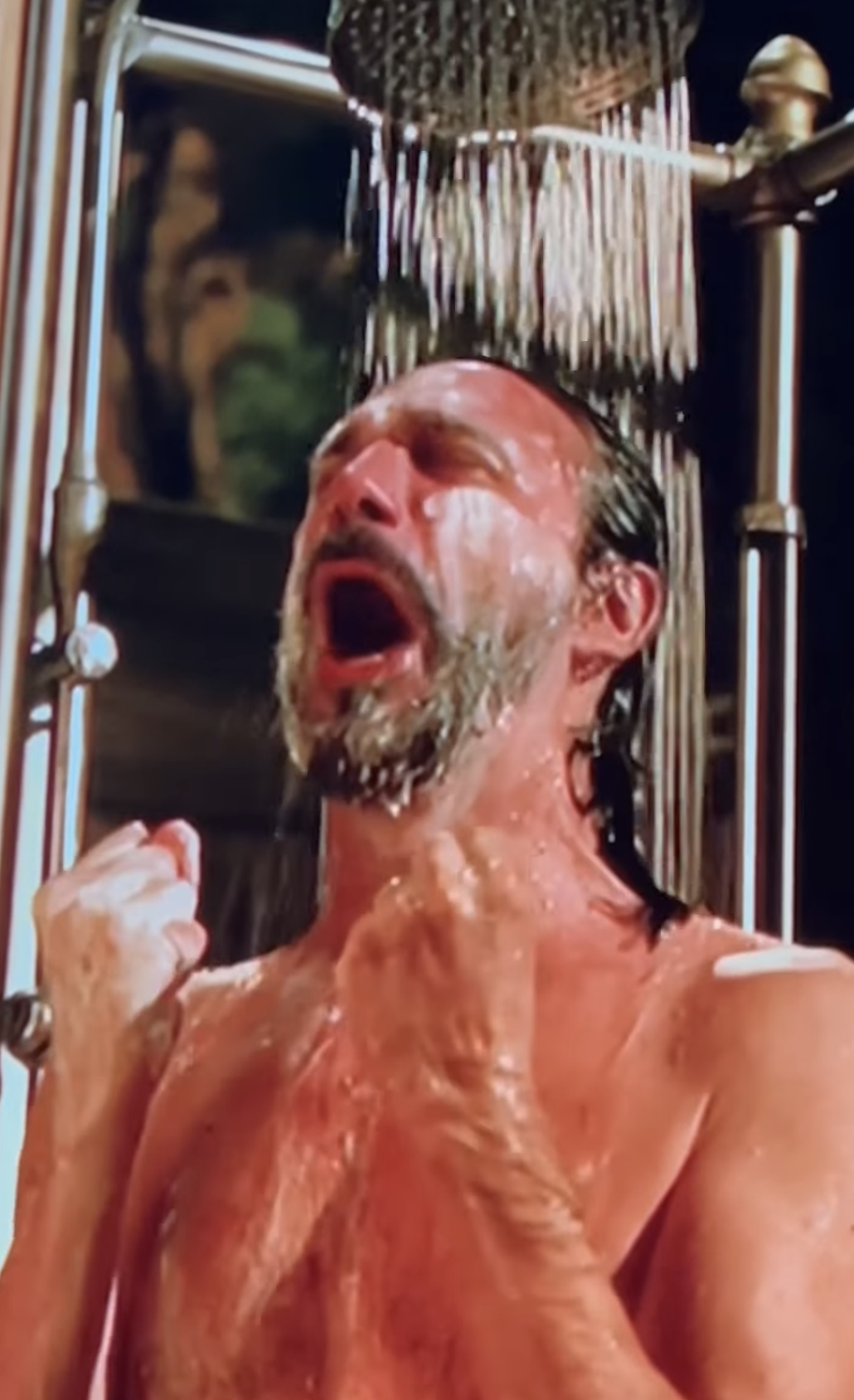Cav/Pag
"Cavalleria Rusticana" and "Pagliacci"
Each short opera will be treated separately below. But first a comment or two about their frequent presentation as "Cav/Pag". As I hope you have surmised, they are frequently presented as a double-bill -- two operas for the price of one! There are at least two good reasons to do so. First, they are both short, 70 and 80 minutes, respectively. Second, they are both in the same verismo style.
Verismo as an opera style covers a period from 1890 through the 1920's. Mascagni's "Cavalleria Rusticana" is considered the first of this style. Other verismo composers includes Leoncavallo (Pagliacci), Puccini, Giordano, Cilea and Massenet. The storylines of verismo operas shifted far away from the kings and mythological Gods of operas of the prior era. Verismo storylines concerned everyday people and their struggles through every day life. Verismo composers also sought to integrate the music and the drama and began the concept of "through-composing" (fully integrated sung music and text). Later, Wagner would epitomize through-composing, especially in his monumental "Der Ring des Nibelungen".
Trivia
Cav/Pag was the first radio broadcast by the Metropolitan Opera on Dec 11, 1910.
Cavalleria Rusticana
1 hr, 9 minutes, Placido Domingo as Turridu
Officially translated as Rustic Chivalry, but perhaps Rustic Honor would better suit. Set on a single day, Easter Sunday, the story is one of betrayal, jealousy and murder. Turridu loves Lola, the prettiest girl in the village. They are engaged. Turridu goes to war. Lola marries Alfio (an older, wealthier man). Turridu returns, annoyed that Lola married Alfio. Turridu courts every girl town, focuses on Santuzza. Turridu promises marriage. Santuzza gets pregant. Turridu was all along trying to make Lola jealous, succeeds. Lola has affair with Turridu. Santuzza challenges Turridu. Santuzza tells off Lola as Lola is about to attend Easter Mass. Santuzza informs Alfio that he's wearing horns. Alfio vows vengeance before the day is over. Everyone goes to Easter Mass. After Mass, Turridu and Alfio talk. Turridu acknowledges he is in the wrong. Turridu and Alfio hug in the manner of a Sicilian duel challenge. Turridu bites Alfio's ear. This is Sicilian for "Your honor has been challenged, a duel has been set, I'll be there, you be there, too." Turridu says goodbye to mother, Lucia, asks her to take care of Santuzza. Turridu goes to meet Alfio in knife fight duel. Turridu expects to die. Turridu is stabbed through the heart and dies.
In Mascagni's time it's likely everyone knew of the Giovanni Verga play by the same name. We don't have that luxury, so by the opera alone we wouldn't know that the story really began some time ago.
Years before, Turridu and Lola were engaged. But a war broke out and Turridu enlisted. He returned to find that Lola had betrayed his love and married Alfio. He plans to make Lola jealous to win her back. He begins wooing every single girl in the village, finally settling on Santuzza. He cavorts publicly with Santuzza. Lola thinks of Turridu has her lover instead of the older man she has married. Turridu notices and begins his assault on Lola. He pays less attention to Santuzza who is now pregnant. This is the backdrop against which the opera begins.
Cavalleria Rusticana was smash hit from day one. It probably did not hurt its success that the then Queen of Italy, Margherita, was in attendance and she loved it. A word or two about the Queen. She was born into a high political circle. She married her first cousin who was the heir apparent to the Italian throne, and who succeeded to the throne in 1878. Her husband, Umberto was the son of Victor Emmanuel II, who reigned in the immediate aftermath of the Italian unification. Their son was VE III, who ruled Italy from 1900-1946. VE III was also Emperor of Ethiopia and Albania for several years each. In her reign Margherita took on the role of marketing the traditional monarchy against republican yearnings. She made it her mission to support local traditions, culture and industry. She was well loved by the Italian public, so much so that a famous pizza was named after her. Thus, it makes perfect sense that a Queen in Rome should attend an opera competition in Rome(see next paragraph).
Interestingly, Cavalleria Rusticana came into existence due to an one-act opera competition. Mascagni was 27 years old and had two months notice to submit a proposal. He hired friends to write the libretto but became disheartened and laid it aside. His wife found the draft in a drawer and submitted it on the last day without his knowledge. Mascagni's was among 73 entries became the grand prize winner. This, his first produced opera, catapulted him to fame and fortune.
Pagliacci is a very well know opera, but not always for the best reasons. It is often parodied: Looney Tunes, Ren and Stimpy and Woody Allen (see below) have all snarkily leveraged the enduring fame of "Vesti la giubba". Fortunately, we also have very fine recordings of the aria by the best tenors the world has ever known (also see below).
Italian / English libretto
Libretto in Italian on the left, English on the right. Studying a libretto in manner is very useful for the ear to pick up key phrases during the actual performance, deepening appreciation for the artistic genius of the composer.
Raging Bull
Mascagni's intermezzo set against a montage of scenes from Martin Scorcese's "Raging Bull".
The Godfather III
In The Godfather III, Michael and Kay's son, Anthony, becomes an opera singer and makes his debut as Terridu in Cavalleria Rusticana. In this clip, the movie ends with the end of the opera, shootings on the steps of the venue and a montage of Michael facing and remembering the brutality of his life's work and the loss of his daughter.
Pagliacci
1 hr 12 minutes, Placido Domingo as Canio
Pagliacci is often the second short, two-act opera in the Cav/Pag double bill. Pagliacci, composed by Ruggero Leoncavallo, premiered on May 21, 1892 in Milan.
Enrico Caruso - Vesti la giubba
Enrico Caruso recording of "Vesti la giubba". Caruso's recording became the first million selling platter.
Luciano Pavarotti - Vesti la giubba
Luciano Pavarotti singing the famous Pagliacci aria. In this clip you can very brightly hear the beautiful "ring" in his voice.
To Rome With Love - Vesti la giubba
Crossover star Fabio Armiliato singing "Vesti la giubba" in the shower. Armiliato gamely portrays a fine tenor who can only sing in the shower. The aria starts at 1:18. Armiliato has fond memories of working with Woody Allen in the film. Here's a quote from an interview: "Sometimes, he'd tell me, 'This was better than last time - can you sing just a little worse?'"

.jpg)
